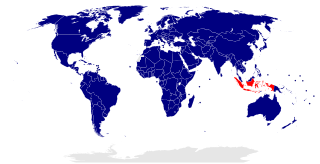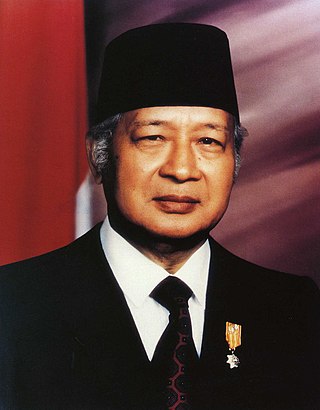
Since independence, Indonesian foreign relations have adhered to a "free and active" foreign policy, seeking to play a role in regional affairs commensurate with its size and location but avoiding involvement in conflicts among major powers. During the Presidency of Sukarno, Indonesia's Foreign Relations were marked by engagement with other newly independent nations in Asia and Africa, as exemplified by the Bandung Conference, the subsequent foundation of the Non-Aligned Movement and a confrontational attitude towards Western powers, justified by a belief in the CONEFO and opposition to what Sukarno termed as NEKOLIM.

Suharto or Soeharto was an Indonesian army officer and politician, who served as the second and the longest serving president of Indonesia. Widely regarded as a military dictator by international observers, Suharto led Indonesia as an authoritarian regime from the fall of his predecessor Sukarno in 1967 until his resignation in 1998 following nationwide unrest. His 32-year dictatorship is considered one of the most brutal and corrupt of the 20th century.
Jusuf Wanandi, a.k.a. Lim Bian Kie is a Chinese-Indonesian politician and educator. Born in Sawahlunto, West Sumatra, on 15 November 1937, he is an older brother of tycoon Sofjan Wanandi.

Hartono Rekso Dharsono, often known as HR Dharsono, was a prominent general in the early years of General Suharto's New Order regime. He served as the first secretary-general of ASEAN.
The S. Rajaratnam School of International Studies (RSIS) is an autonomous graduate school and policy-oriented think tank within the Nanyang Technological University (NTU), Singapore. Founded in 1996 as the Institute of Defence and Strategic Studies, RSIS offers graduate education in international affairs, taught by an array of international faculty. The school is named after former Deputy Prime Minister S. Rajaratnam.

Ali Murtopo was a prominent Indonesian general and political figure during the first half of General Suharto's New Order regime.

The Economic Research Institute for ASEAN and East Asia or ERIA is an international organization established in Jakarta, Indonesia in 2008 by a formal agreement among Leaders of 16 countries in the East Asian region to conduct research activities and make policy recommendations for further economic integration in the East Asia. ERIA works very closely with both the ASEAN Secretariat and 16 Research Institutes to undertake and disseminate policy research under the three pillars, namely “Deepening Economic Integration”, ”Narrowing Development Gaps”, and “Sustainable Development” and provide analytical policy recommendations to Leaders and Ministers at their regional meetings. ERIA provides intellectual contributions to East Asian Community building and serves as a Sherpa international organization. ERIA Ranks 9th among the world's "Top International Economics Think Tanks" according to the 2020 Global Go To Think Tanks Index Report conducted by the University of Pennsylvania.
Josephus Beek SJ was a Dutch and later Indonesian Jesuit, priest, educator and politician. From approximately 1965 until approximately 1975 he was a very important political consultant to the Indonesian president Suharto, but always remained in the shade.

The Ministry of Foreign Affairs of the Republic of Indonesia or commonly known by its abbreviation Kemlu, is an Indonesian government ministry responsible for the country's foreign politics and diplomacy. The ministry was formerly known as the Department of Foreign Affairs until 2008 when the nomenclature changed with the enactment of the 2008 State Ministry Act.

Sofjan Wanandi, a.k.a. Lim Bian Khoen is an Indonesian businessman and the majority owner of Santini Group. Born in Sawahlunto, West Sumatra, he is the brother of Jusuf Wanandi, a senior politician and one of the founders of the CSIS think tank in Jakarta.
Hadi Soesastro was an Indonesian economist, academic and public intellectual. Hadi was one of the founders of the Centre for Strategic and International Studies (CSIS), a think tank founded in 1971, where he served as an executive director and economist. The Jakarta Post referred to Soesastro as "one of Indonesia’s foremost economists."

The Enlargement of the Associationof Southeast Asian Nations is the process of expanding the Association of Southeast Asian Nations (ASEAN) through the accession of new member states. This process began with ASEAN's five original members, who founded the association through the signing of the Bangkok Declaration in 1967. Since then, the ASEAN's membership has grown to ten with the accession of Cambodia in 1999.
The Singapore Institute of International Affairs (SIIA) is a Singaporean research institute and think tank which focuses on international relations, especially in ASEAN and the Asia-Pacific (APAC). The Institute conducts research, hosts events, and plans conferences that deal with pressing issues in international affairs. It is the oldest think tank in Singapore, being founded in 1961.
The Indonesia Project is a center of research and graduate training on the Indonesian economy at the Australian National University (ANU). It is located in the Arndt-Corden Department of Economics, Crawford School of Public Policy, part of the ANU College of Asia and the Pacific in Canberra. It was established in 1965 with an initial grant from the Ford Foundation.
The East Asian Bureau of Economic Research (EABER) is a forum for economic research and analysis of the major issues facing the economies of East Asia.
Johannes Baptista Soedjati Djiwandono was an Indonesian political scientist who helped found the Centre for Strategic and International Studies (CSIS) in Jakarta, one of Indonesia's leading think tanks.

Major General Soedjono Hoemardani was an Indonesian military officer.

Free and Open Indo-Pacific is an umbrella term that encompasses Indo-Pacific-specific strategies of countries with similar interests in the region. The concept, with its origins in Weimar German geopolitics, has been revived since 2006 through Japanese initiatives and American cooperation.
Andy Rachmianto, M.Phil, is a career diplomat and government official. He is now Director-General for Protocol and Consular Affairs/Chief of State Protocol, Ministry of Foreign Affairs, Republic of Indonesia.










